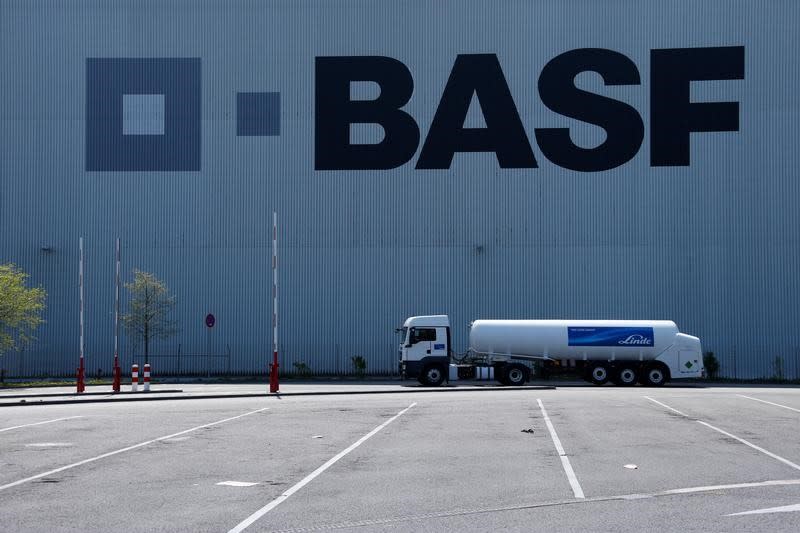Incoming BASF boss rules out DowDuPont-style break-up

By Ludwig Burger and Patricia Weiss
FRANKFURT (Reuters) - The incoming boss of BASF (BASFn.DE) has thrown his weight behind the chemical titan's contentious strategy of keeping divergent businesses folded into one company, at a time when its major rivals such as DowDuPont are breaking themselves up.
The comments from Martin Brudermueller, who will take over as CEO on Friday, provide clarity on a key strategic issue that is dividing investors, in marked contrast to predecessor Kurt Bock who would not be drawn on which path he favored.
The German group has grown from a 19th century indigo dye workshop to a diversified juggernaut worth $95 billion. It is the only major Western chemicals player banking on an integrated value chain - which it dubs "Verbund" - where a company owns businesses throughout the production process.
"We often hear the Verbund getting criticized for being too rigid. That's not true," said 56-year-old Brudermueller.
"If you have everything under one roof, you can coordinate things much better, that is the sense in which we will develop it further. You wouldn't normally want to sell attractive businesses that are growing," he told Reuters and other reporters in remarks released late on Tuesday.
At its Ludwigshafen headquarters and at five other hubs abroad, BASF runs close-knit networks of chemical reactors that churn out products as diverse as basic commodities, coatings, vitamins, drug ingredients and engineering plastics.
Bock, when asked in February whether BASF would continue to have diverse businesses under one roof or was considering other options, said the company might learn from what rivals did but did not say which path he favored.
Both strategies have potential advantages; break-ups can create more focused individual companies and allow stronger units to attract investors unshackled from weaker ones, while an integrated model can reduce costs.
U.S. rival DowDuPont (DWDP.N) is planning to break up into a Materials Science division that relies on in-house basic petrochemicals plants and a Specialty Products unit selling more differentiated and complex materials. A third spin-off will focus on agriculture.
In other recent separation deals in the industry, Bayer (BAYGn.DE) spun off its Covestro plastics unit and is now selling down the shares, Air Products spun-off specialty chemicals unit Versum (VSM.N) and coatings group Akzo Nobel (AKZO.AS) is selling its specialty chemicals division.
SHAREHOLDERS SPLIT
BASF competes with DowDuPont in areas such as pesticides, engineering plastics, nutrition, insulation foams and petrochemicals. Its rival's three-way split will restore BASF's position as the world's largest chemical maker but some investors and analysts would rather see it lose that crown.
Patrick Jahnke, portfolio manager at Deka Investments, which owns BASF stock, said he favored the firm selling its upstream petrochemical assets, saying the benefits of physical proximity to downstream operations could be shared with a new owner.
"You can sell the assets but the factory remains in place," Jahnke said. "There are many who would pay a high price (for upstream BASF assets). Private equity would run the business with higher debt and optimized for cash flows and would arrive at a better profitability," he added.
Upstream refers to basic petrochemicals, and downstream to more complex specialty chemicals.
A portfolio manager at a top 20 BASF shareholder, who declined to be named as they are not authorized to comment publicly on the investment, also saw the merits of a break-up.
"Downstream, speciality chems could work separately," the manager said. "To de-clutter and reduce complexity ... tends to increase multiples and returns, but German companies are not well known for it."
BASF has said that sharing logistics, excess energy and by-products within its chemical complexes saves it more than 1 billion euros ($1.2 billion) per year.
There are also supporters of the integrated approach among BASF's shareholders.
Arne Rautenberg, of Union Investment, said there was still a lot of value in the model.
"The results this year wouldn't have been good without the basic chemicals assets," he said. Any move to separating them from the rest "would very much surprise me and I wouldn't be excited", he added.
TALE OF TWO SECTORS
BASF has been a tale of two sectors over the past year.
Supply bottlenecks at rivals and strong industrial demand have flung BASF's basic chemicals business into a surprise upward cycle. Meanwhile, margins of its more complex, specialty products, the group's designated growth drivers, have been squeezed by higher raw materials prices.
"If upstream strength dissipates and the downstream margin struggles continue, then we think investor focus will turn to portfolio questions," HSBC analyst Sriharsha Pappu said in a recent research note.
If allowed to strike out on their own, BASF units making construction chemicals, coatings and catalytic converters could bolster their earnings and fetch better trading multiples on the stock market, the HSBC analyst said.
Brudermueller, a BASF veteran, is currently chief technology officer and deputy CEO at the firm, which is due to report first-quarter results on Friday. He said that his focus would be on new technologies after taking over from CEO Bock, who by contrast had been the company's finance chief before taking the helm and has a background in business administration.
The CEO-designate cited cathode materials for car batteries as one area of focus, and also using BASF's new supercomputer to speed up discovery of new compounds.
"The fact that I have a background in technology and science will result in us having a change in perspective," he said, adding that he would provide an update on BASF's strategy towards the end of the year.
(Additional reporting by Simon Jessop in London; Editing by Pravin Char)

 Yahoo Finance
Yahoo Finance 